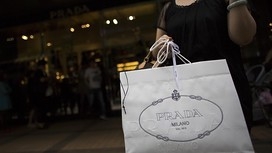
May Liu earns about $2,500 a month as an office worker in Hong Kong, but she spends about 10 to 15 times that on luxury goods, buying everything from Prada handbags to products from US cosmetic brand Fresh.
May Liu是一名在香港工作的辦公室文員,每月收入約2500美元,但她在奢侈品上的花費(fèi)是這一金額的10至15倍,購(gòu)買(mǎi)的產(chǎn)品從普拉達(dá)(Prada)的手袋到美國(guó)馥蕾詩(shī)(Fresh)的化妝品無(wú)所不包。
While Ms Liu loves shopping, she buys mostly for others in her role as a “daigou” agent – a growing breed of people who specialise in helping mainland Chinese consumers secure products from overseas.
雖然May Liu喜歡購(gòu)物,但她主要是作為一名“代購(gòu)”幫別人買(mǎi)東西——作為一個(gè)人數(shù)日漸增長(zhǎng)的群體,代購(gòu)專(zhuān)門(mén)幫助中國(guó)內(nèi)地顧客從境外購(gòu)買(mǎi)商品。
She started her daigou business a year ago as a way to earn more money, but the young mainland Chinese was soon bringing in up to $10,000 a month. Ms Liu now has about 2,600 clients, who use Weibo, China’s equivalent of Twitter, and WeChat, a messaging app, to order goods.
她一年前開(kāi)始從事代購(gòu)業(yè)務(wù),以增加收入,但不久之后,這位來(lái)自中國(guó)內(nèi)地的年輕人每月最高就可進(jìn)賬一萬(wàn)美元。May Liu現(xiàn)在約有2600名客戶(hù),這些客戶(hù)通過(guò)微博(Weibo,相當(dāng)于中國(guó)的推特(Twitter))以及聊天應(yīng)用微信(WeChat)來(lái)下單訂購(gòu)商品。
“I didn’t know how much money I would make. I didn’t have any expectation of profits,” says Ms Liu, who asked to use a pseudonym. “I only knew it would be profitable.”
May Liu要求使用化名。她說(shuō):“我不知道自己能賺到多少錢(qián)。我對(duì)利潤(rùn)沒(méi)有任何預(yù)期。我只知道這一行能賺錢(qián)。”
She has not given up her day job, realising that being a daigou agent, while highly profitable, can also be illegal.
她沒(méi)有辭去正職工作,因?yàn)樗靼祝?gòu)這一行雖然利潤(rùn)豐厚,但可能是違法違規(guī)的。
Some agents focus on ferrying goods from Hong Kong to mainland China.
一些代購(gòu)專(zhuān)門(mén)從事將商品從香港代送到中國(guó)內(nèi)地的業(yè)務(wù)。
But the web-based phenomenon has spread to expatriate Chinese who are help compatriots back home buy brands from cities such as Paris, London, New York, Hong Kong, Tokyo and Seoul.
但這一興起于網(wǎng)絡(luò)的現(xiàn)象現(xiàn)已擴(kuò)散到了旅居海外的中國(guó)僑胞群體,他們幫助國(guó)內(nèi)同胞從巴黎、倫敦、紐約、香港、東京以及首爾等城市購(gòu)買(mǎi)名牌商品。
The daigou boom is an example of how ecommerce is rapidly transforming the Chinese retail market.
代購(gòu)熱潮是一個(gè)明證,表明電子商務(wù)正在快速改變中國(guó)零售市場(chǎng)的面貌。
According to Chinese media, there are hundreds of thousands of people working in the daigou business. A search for the term on Alibaba’s Taobao, China’s largest online marketplace, produces more than 240,000 virtual stores and nearly 15m items from child car seats through air purifiers to pocket printers.
據(jù)中國(guó)媒體報(bào)道,目前有好幾十萬(wàn)人在從事代購(gòu)業(yè)務(wù)。在阿里巴巴(Alibaba)旗下網(wǎng)站淘寶(Taobao)上搜索“代購(gòu)”一詞,會(huì)顯示出超過(guò)24萬(wàn)個(gè)網(wǎng)絡(luò)店鋪以及近1500萬(wàn)種商品,從兒童汽車(chē)座椅、空氣凈化器到便攜式打印機(jī)無(wú)所不包。淘寶是中國(guó)最大的在線交易平臺(tái)。
The China e-Commerce Research Centre says the daigou market grew 19-fold between 2008 and 2012 when it reached Rmb48bn, and reckons that it rose again in 2013 to Rmb74bn ($12bn). According to a recent study by Bain, about 60 per cent of the Chinese consumers who buy luxury goods have used daigou at some point.
中國(guó)電子商務(wù)研究中心(China e-Commerce Research Centre)表示,代購(gòu)市場(chǎng)在2008至2012年間增長(zhǎng)了19倍,規(guī)模達(dá)到了人民幣480億元,2013年代購(gòu)市場(chǎng)繼續(xù)增長(zhǎng),規(guī)模達(dá)到了人民幣740億元(合120億美元)。貝恩公司(Bain & Company)近期進(jìn)行的一項(xiàng)研究顯示,約有60%的中國(guó)奢侈品消費(fèi)者曾經(jīng)使用過(guò)代購(gòu)服務(wù)。
The business is thriving for several reasons. Many Chinese believe the same product is better made when bought overseas because of the mainland’s uneven reputation for quality.
代購(gòu)行業(yè)蓬勃發(fā)展主要是由于以下幾個(gè)原因。很多中國(guó)人認(rèn)為,同一種產(chǎn)品,購(gòu)自海外的質(zhì)量會(huì)好一點(diǎn),因?yàn)橹袊?guó)大陸的產(chǎn)品有著質(zhì)量不穩(wěn)定的名聲。
The rising strength of the renminbi, the growing purchasing power of Chinese consumers, and high-profile food safety scandals in China, have also spurred demand for safe and high-quality foreign products.
人民幣匯率穩(wěn)步走強(qiáng),中國(guó)消費(fèi)者的購(gòu)買(mǎi)力不斷提升,中國(guó)食品安全丑聞引起公眾關(guān)注,也都刺激了市場(chǎng)對(duì)安全性高、質(zhì)量又好的外國(guó)產(chǎn)品的需求。
Mo Daiqing, an analyst at the e-commerce research centre, says the main reason Chinese are turning to daigou is because of hefty import tariffs on luxury goods. China levies a 50 per cent duty on cosmetics, one of the dominant daigou categories, and that is before the imposition of the standard 17 per cent value added tax that is added to imported luxury products.
中國(guó)電子商務(wù)研究中心的分析師莫岱青表示,中國(guó)消費(fèi)者轉(zhuǎn)向代購(gòu)的主要原因是,國(guó)內(nèi)對(duì)奢侈品的進(jìn)口關(guān)稅太高。目前中國(guó)對(duì)化妝品征收50%的關(guān)稅(這是代購(gòu)商品中的一大主要門(mén)類(lèi)),而在此之后還要再對(duì)進(jìn)口奢侈品按標(biāo)準(zhǔn)征收17%的增值稅。
“The same brands of milk powder, cosmetics and handbags are much cheaper in Hong Kong, the US, Japan and South Korea than in mainland China,” said Ms Mo.
莫岱青表示:“同樣品牌的奶粉、化妝品以及手袋,在香港、美國(guó)以及韓國(guó)買(mǎi)的要比在中國(guó)大陸便宜很多。”
But the industry is increasingly drawing attention from customs officials in mainland China and Hong Kong, particularly with the rising numbers of so-called parallel traders who take advantage of multi-entry visas to cross the border at the southern Chinese city of Shenzhen many times a day, carrying products for resale that they do not declare at customs.
但代購(gòu)行業(yè)正日益受到中國(guó)內(nèi)地和香港海關(guān)官員的關(guān)注,特別是人數(shù)越來(lái)越多的“水客”(parallel traders)。這類(lèi)人利用一簽多行政策,在中國(guó)南方城市深圳每日穿越邊境多次,將所攜帶的未報(bào)關(guān)商品在境內(nèi)轉(zhuǎn)手出售。
Dong Yizhi, a lawyer who specialises in ecommerce, points out that the daigou business is not illegal if the agents pay import taxes, but says that if agents pay duties the premise of the business becomes moot.
專(zhuān)長(zhǎng)電商領(lǐng)域的律師董毅智指出,如果代購(gòu)人員支付進(jìn)口關(guān)稅,那么代購(gòu)業(yè)務(wù)就不是違法的;但在這種情況下,代購(gòu)將失去存在的意義。
“If they pay customs duties, the price disparities will be much smaller and they won’t make money,” said Mr Dong.
董毅智表示:“如果代購(gòu)支付關(guān)稅,國(guó)內(nèi)外商品的差價(jià)將顯著縮窄,代購(gòu)就賺不了什么錢(qián)。”
Chinese citizens can legally import Rmb5,000 ($823) of duty-free goods for personal use each time they return to the mainland. But Shenzhen customs officers are taking a tougher line on parallel traders who cross the border back into the mainland more than once a day with goods over the value of Rmb500.
中國(guó)公民從境外返回中國(guó)大陸時(shí),每次可以依法攜帶價(jià)值不超過(guò)人民幣5000元(合823美元)的免稅商品供個(gè)人使用。但深圳海關(guān)對(duì)每天往返境內(nèi)超過(guò)一次的水客采取了更加嚴(yán)厲的標(biāo)準(zhǔn):每次攜帶的免稅貨品價(jià)值不得超過(guò)人民幣500元。
Liu Lizhen, a Shenzhen customs official, said the move was aimed at clamping down on the abuse of the multiple re-entry system.
深圳海關(guān)官員劉麗珍(音譯)表示,此舉旨在打擊濫用多次往返簽證機(jī)制的情況。
This has become a more serious issue in Hong Kong since 2009 when it started allowing Shenzhen permanent residents to enter the former British colony without restrictions.
自2009年以來(lái),水客在香港已經(jīng)成了一個(gè)愈發(fā)嚴(yán)重的問(wèn)題。香港自2009年開(kāi)始允許深圳市永久居民不限次數(shù)前往這片曾經(jīng)的英屬殖民地。
“We once found a person who had crossed the border 26 times a day,” said Ms Liu.
劉麗珍稱(chēng):“我們?cè)?jīng)發(fā)現(xiàn)過(guò)一個(gè)人,他在一天之內(nèi)穿越邊境26次。”
According to the Shenzhen customs bureau, more than 20,000 parallel traders operate at the six land border checkpoints between Hong Kong and the southern Chinese city.
來(lái)自深圳海關(guān)的信息顯示,在香港與深圳之間的6個(gè)陸路口岸往返的水客數(shù)量超過(guò)了兩萬(wàn)人。
Hong Kong’s immigration department said just over a thousand parallel traders were arrested last year for breaching the terms of their stay in the territory.
香港入境事務(wù)處表示,去年超過(guò)1000名水客因?yàn)檫`反在香港境內(nèi)的逗留條款而被逮捕。
Despite the crackdown, May Liu, the daigou agent, says she is not worried, and still travels to Shenzhen a few times a week.
雖然面臨政府打壓,但作為一名代購(gòu)的May Liu表示自己并不擔(dān)心,仍然每周數(shù)次前往深圳。
“Carrying so much stuff across the border every time provides me with a lot of exercise. I don’t even have to go to the gym,” jokes Ms Liu.
她開(kāi)玩笑稱(chēng):“每次帶這么多東西穿越邊境對(duì)我來(lái)說(shuō)是強(qiáng)度很大的鍛煉。我甚至都不用去健身房了。”
‘Brands are much cheaper in Hong Kong, the US, Japan and South Korea than China’
“名牌商品在香港、美國(guó)、日本以及韓國(guó)的售價(jià)遠(yuǎn)比在中國(guó)內(nèi)地便宜。”


